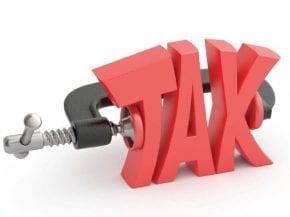- browse by category
- Audit Assistance
- Business and Taxes
- Celebrities in Tax Debt
- Cryptocurrency Taxes
- Economic News
- Foreign Banking
- Innocent Spouse
- IRS debt settlement
- IRS Headlines
- IRS Wage Garnishment
- Marriage & Divorce
- Payroll Tax
- Retirement
- Revenue Officers
- State Tax Headlines
- Stop IRS Debt
- Success Stories
- Tax and Politics
- Tax Attorney
- Tax Codes
- Tax Debt Help
- Tax Evasion
- Tax Levy
- Tax Lien
- Tax Payment Plans
- Tax Return Filing
- Tax Tips

So you’ve run up some back tax debt with the IRS. It may not seem like a big deal at first, but the IRS is the one creditor you’ll want to steer clear of. The law is on the IRS’s side when it comes to collecting back tax debt. There are a variety of ways it can do that, and a levy on a taxpayer’s or business’s bank account is one of them. If the IRS levied your bank account, you need a plan.
Bank levies are different from liens. Liens are claims to property, typically a home, that’s used as a security for debt. Levies, on the other hand, are actual seizures of your property. And the IRS uses them to go into your bank account and take what it says it’s owed to resolve back tax debt.
Being Proactive is Key to Removing Your Levy
Bank levies are issued after IRS procedures take their course (there’s a notice letter, a 30-day opportunity to pay the debt goes unanswered, and a final notice is sent giving 30 days notice).
But if the IRS issues a levy and it takes a hit on your finances, working with a tax attorney to explain your situation is the first step you should take. The IRS may even remove the levy, but the tax debt will remain.
This will leave you in a position to negotiate your tax debt with the IRS and agree on a payment plan. If certain conditions are met and the back tax debt is substantial, you can even pursue an Offer in Compromise, but that’s a whole other ball game that’s best left up to the expertise of a tax attorney.
Another option to pursue after being hit with an IRS bank levy is to request a Collection Due Process hearing. After you receive a Notice of Intent to Levy from the IRS, you’ll have 30 days to request the hearing. You’ll have to file IRS Form 12153 and list all your disagreements so the IRS can address them. Some issues you should raise include defenses like spousal defense, procedural errors made by the IRS, lack of an opportunity to dispute the back tax debt amount, and the running of the statute of limitations. You can also use this hearing to relay your desire to discuss collection options.
The hearing can impact your legal rights. So, make sure to seek out the advice of a tax attorney before taking this route.
The IRS may also owe you money if your bank issued charges due to an IRS mistake. Reimbursement claims can be filed, which can lead to the IRS covering your bank charges.
IRS levied your bank account? Get help today.
Owing back tax debt to the IRS can be bad. And that situation is made worse when the IRS hits your bank account with a bank levy. While the seizure of your money can be rough, the help of a tax attorney can resolve the matter.
Has your bank account even been levied? How did you handle the situation? Comment below or tweet us @StopIRSDebt!
Leave Comments

Top Tax
secrets revealed
Sign up for our newsletter and be the first to find out when exciting IRS news happens. Yes, exciting. We're really into taxes.


